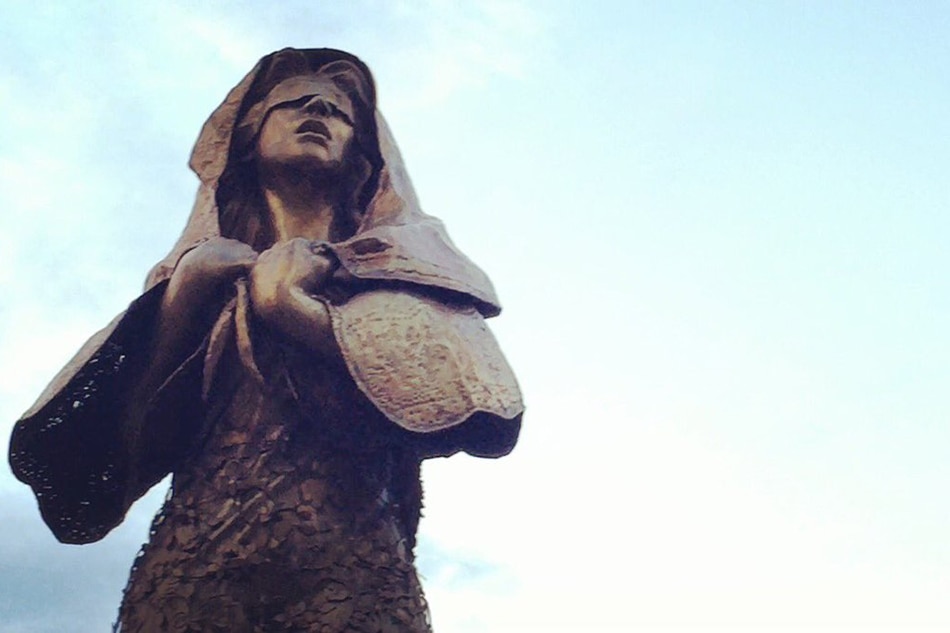Let's not insult Japan: Duterte backs removal of 'comfort woman' statue | ABS-CBN
ADVERTISEMENT

Welcome, Kapamilya! We use cookies to improve your browsing experience. Continuing to use this site means you agree to our use of cookies. Tell me more!
Let's not insult Japan: Duterte backs removal of 'comfort woman' statue
Let's not insult Japan: Duterte backs removal of 'comfort woman' statue
ABS-CBN News
Published Apr 29, 2018 10:53 AM PHT
MANILA - President Rodrigo Duterte on Sunday defended the removal of a "comfort woman" statue along Roxas Boulevard in Manila.
MANILA - President Rodrigo Duterte on Sunday defended the removal of a "comfort woman" statue along Roxas Boulevard in Manila.
"Comfort women" was Japan's euphemism for Asian women who were forced to work in its wartime brothels. Japan has apologized to the women and provided funds to help them.
"Comfort women" was Japan's euphemism for Asian women who were forced to work in its wartime brothels. Japan has apologized to the women and provided funds to help them.
The comfort woman statue in Roxas Boulevard was removed recently to give way to a drainage improvement project, the public works department said Saturday.
The comfort woman statue in Roxas Boulevard was removed recently to give way to a drainage improvement project, the public works department said Saturday.
Duterte said the statue can be placed in a private property so as not to insult Japan.
Duterte said the statue can be placed in a private property so as not to insult Japan.
ADVERTISEMENT
"We can place it somewhere else. If you want to place it in a private property, fine, but do not use -- because that issue, in so far as I am concerned, tapos na iyan (that's over)," he said in a speech in Davao City.
"The Japanese has paid dearly for that. Iyung reparation started many years ago. Huwag na lang natin insultuhin... It is not the policy of government to antagonize other nations," he added.
"We can place it somewhere else. If you want to place it in a private property, fine, but do not use -- because that issue, in so far as I am concerned, tapos na iyan (that's over)," he said in a speech in Davao City.
"The Japanese has paid dearly for that. Iyung reparation started many years ago. Huwag na lang natin insultuhin... It is not the policy of government to antagonize other nations," he added.
(The repatriation started many years ago. Let's just not insult them.)
(The repatriation started many years ago. Let's just not insult them.)
Duterte also said bringing up the plight of comfort women repeatedly would bring pain.
Duterte also said bringing up the plight of comfort women repeatedly would bring pain.
"Masakit kasi na ulit-ulitin and you start to imagine how they were treated badly," he said.
"Masakit kasi na ulit-ulitin and you start to imagine how they were treated badly," he said.
Tinanggal na ang Comfort Woman statue sa Roxas blvd Mla. Ayon kay Atty. Ericson Alcovendaz, manila city administrator, ito ay para sa gagawing flood control program ng DPWH. @DZMMTeleRadyo pic.twitter.com/7M3Qql4kvE
— Fred Cipres (@RPfredcipres) April 28, 2018
Tinanggal na ang Comfort Woman statue sa Roxas blvd Mla. Ayon kay Atty. Ericson Alcovendaz, manila city administrator, ito ay para sa gagawing flood control program ng DPWH. @DZMMTeleRadyo pic.twitter.com/7M3Qql4kvE
— Fred Cipres (@RPfredcipres) April 28, 2018
Women's rights group Gabriela had condemned the unannounced removal of the statue, saying it was a "desecration of Filipino women's dignity as it casts a foul insult on hundreds of Filipina sex slaves victimized under the Japanese occupation."
Japan earlier aired its displeasure over the structure to President Rodrigo Duterte.
Women's rights group Gabriela had condemned the unannounced removal of the statue, saying it was a "desecration of Filipino women's dignity as it casts a foul insult on hundreds of Filipina sex slaves victimized under the Japanese occupation."
Japan earlier aired its displeasure over the structure to President Rodrigo Duterte.
Duterte had responded by saying that the statue is a symbol of freedom of expression, which relatives of comfort women and living comfort women are entitled to use.
Duterte had responded by saying that the statue is a symbol of freedom of expression, which relatives of comfort women and living comfort women are entitled to use.
"That is a constitutional right which I cannot stop. It’s prohibitive for me to do that,” he said.
"That is a constitutional right which I cannot stop. It’s prohibitive for me to do that,” he said.
The National Historical Commission of the Philippines on December 8 unveiled the 2-meter-high bronze statue. It followed the erection of similar statues in South Korea, China and Australia.
The National Historical Commission of the Philippines on December 8 unveiled the 2-meter-high bronze statue. It followed the erection of similar statues in South Korea, China and Australia.
Some 1,000 Filipinos served as comfort women during the 1941 to 1945 Japanese occupation.
Some 1,000 Filipinos served as comfort women during the 1941 to 1945 Japanese occupation.
ADVERTISEMENT
ADVERTISEMENT



